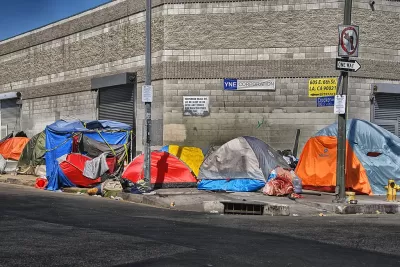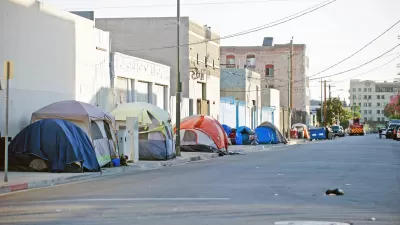Terrible news about the financial situation at one of L.A.’s most prominent homeless service providers broke earlier this month.

“Skid row’s flagship owner and operator of subsidized housing is on the verge of financial collapse and seeking a lifeline to keep its doors open for more than a thousand low-income tenants,” reports Benjamin Oreskes and Doug Smith from Los Angeles.
The owner and operator in question is the Skid Row Housing Trust—an organization that pioneered “the decades-old movement to revive aging downtown real estate as homeless housing, has been working with other housing providers to take over its 29 buildings,” according to the article.
So far, several other philanthropic organizations—namely the Weingart Foundation, the Hilton Foundation, and Cedars-Sinai—have stepped up to keep the organization afloat, but the news still comes as a devastating blow to social work in one of the nation’s most troubled neighborhoods.
“For more than three decades, the trust has been a mainstay of Los Angeles’ nonprofit housing community, building and managing nearly 2,000 units of single residence occupancy buildings and permanent supportive housing,” add Orekes and Smith by way of explaining the central role of the Skid Row Housing trust in providing housing and support for the tens of thousands of people experiencing homelessness in and around Downtown Los Angeles.
Unfortunately, the organization has been operating at annual deficits of up to $14 million for years. The article implies some blame for the strategies employed by the organization in recent years—pivoting toward new construction and commissioning “architecturally striking” buildings while the maintenance needs of older buildings increased with the age of the buildings.
“But a portfolio dominated by buildings from the first half of the 20th century became increasingly challenging to support. As maintenance needs outstripped revenue, hundreds of units remained in uninhabitable condition after tenants left, creating a vicious cycle of declining rents. Occupancy at their buildings has dipped to about 78%,” according to a source cited in the article.
More details on the history and impact of the Skid Row Housing Trust, and the contingencies for righting the ship, are included in the article below.
FULL STORY: One of skid row’s largest housing providers faces financial implosion

Alabama: Trump Terminates Settlements for Black Communities Harmed By Raw Sewage
Trump deemed the landmark civil rights agreement “illegal DEI and environmental justice policy.”

Study: Maui’s Plan to Convert Vacation Rentals to Long-Term Housing Could Cause Nearly $1 Billion Economic Loss
The plan would reduce visitor accommodation by 25% resulting in 1,900 jobs lost.

Planetizen Federal Action Tracker
A weekly monitor of how Trump’s orders and actions are impacting planners and planning in America.

Wind Energy on the Rise Despite Federal Policy Reversal
The Trump administration is revoking federal support for renewable energy, but demand for new projects continues unabated.

Passengers Flock to Caltrain After Electrification
The new electric trains are running faster and more reliably, leading to strong ridership growth on the Bay Area rail system.

Texas Churches Rally Behind ‘Yes in God’s Back Yard’ Legislation
Religious leaders want the state to reduce zoning regulations to streamline leasing church-owned land to housing developers.
Urban Design for Planners 1: Software Tools
This six-course series explores essential urban design concepts using open source software and equips planners with the tools they need to participate fully in the urban design process.
Planning for Universal Design
Learn the tools for implementing Universal Design in planning regulations.
Caltrans
Smith Gee Studio
Institute for Housing and Urban Development Studies (IHS)
City of Grandview
Harvard GSD Executive Education
Toledo-Lucas County Plan Commissions
Salt Lake City
NYU Wagner Graduate School of Public Service





























